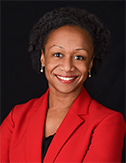Organized by University of Michigan Medical School students, the annual Sujal Symposium brings together students across the U-M health sciences schools – and increasingly other regional schools as well – to share, showcase, and learn about work in health disparities global and local. Prior meetings have focused on interdisciplinary approaches to disparities, single issues like the ongoing Flint water crisis, and impacts of learners engaged in low-resource settings. This marks the first time organizers have looked at advocacy, with a keynote speech from Dr. Joneigh Khaldun, Michigan’s newly appointed Chief Medical Executive, a multidisciplinary panel connecting research and advocacy, a faculty debate, and much more.

“As medical students, all of us are confronted with health disparities as part of our training. We come away with the same questions: I’m just one person in this massive, complex system, so what can I do about this? What is my responsibility?” said M1 Ryan Townsend, one of several students on this year’s Sujal Symposium organizing committee. “We felt like examining providers’ role as advocates could be a rich area to explore.”
The event takes place Sept. 14 at the Biomedical Science Research Building (BSRB). Registration is now open and organizers are accepting poster abstracts as well as submissions for photo and essay competitions. Below, find eight things you need to know about this year’s Sujal Symposium.
Showcase your projects to peers: The Symposium’s poster session is intended to showcase student research – from any health science discipline – highlighting domestic or international disparities. Entries are reviewed and scored by faculty and student judges, making the session a good opportunity for young scholars to not only share their project, but also hone their presentation skills and get real-time feedback from experienced researchers. Last year’s Sujal Symposium drew posters from numerous UM schools, but also entries from medical schools at Central Michigan, Wayne State, and Michigan State. There are small cash prizes for selected winners. Submit abstracts by Aug. 16, 2019.
Picture (or write!) this: Photo and essay contests planned as part of this year’s symposium provide an opportunity for participants to highlight their prior experience in the field and tie it into the broader conference theme of addressing disparities through advocacy. The deadline to submit entries is Aug. 16, 2019.

Keynote Address from Michigan’s top medical officer: Dr. Joneigh S. Khaldun was appointed this spring as the Chief Medical Executive and Chief Deputy Director for the Michigan Department of Health and Human Services. Before that, the Ann Arbor native and UM alum served as Director and Health Officer at the Detroit Health Department. Dr. Khaldun has led several coordinated public health responses, including Detroit’s response to the largest Hepatitis A outbreak in Michigan history, vaccinating over 8,500 residents and establishing vaccination procedures in hospitals, clinics and social service agencies. She also led Baltimore’s nationally recognized response to the opioid epidemic, expanding access to naloxone and treatment.
Connect with students already involved in advocacy: One Sujal session will feature the UMMS Medical Educational Consulting Group, or Med ECG, a student organization that seeks to connect learners with mission-minded healthcare organizations in the community. Here student members discuss a number of organizational projects with regional health organizations, from implementing scheduling reforms to reduce patient appointment no-shows and cancellations, to conducting researching payer contracting and value-based care initiatives.
Hear from faculty in different disciplines about their approach to advocacy: Three U-M faculty members will discuss how their respective research helps address aspects of health disparities, and how they view their role as advocates in the panel, “Connecting Research to Advocacy: Perspectives from Three Disciplines”.
- Assistant Professor of Nursing Yasamin Kusunoki, PhD, MPH, studies sources of gender, racial/ethnic, and socioeconomic disparities in sexual and reproductive health among young people.
- Assistant Professor of Internal Medicine Renuka Tipirneni, MD, conducts health policy and health services research, including primary care practice design and Medicaid policy.
- Clinical Assistant Professor of Pharmacy Sarah Vordenberg, PharmD, MPH, explores optimization of medication use among older adults via de-prescribing and interprofessional community health engagement with residents of Ann Arbor.
Event namesake: The Sujal Symposium is named for Sujal Parikh, a UMMS student who passed away in 2010 while doing health research in Uganda where he was a Fogarty International Center Scholar engaged in HIV research. Sujal’s parents, friends, classmates and colleagues established the annual event in his memory to highlight the health equity issues Sujal cared so deeply about. Read more about Sujal’s legacy here.
Lunch: You know how they say there’s no such thing as a free lunch? They’re wrong. Lunch will be provided to all registered Sujal Symposium attendees.
